If you’re a small business looking to build a website, then you likely want a budget-friendly option that doesn’t involve hiring an expensive website developer. This is where drag & drop website builder tools come in.
You can use a website builder to create your own website without knowing any HTML, CSS, or any coding for that matter. Over the last 16 years, I have built hundreds of websites ranging from simple business websites and blogs to complex online eCommerce stores.
I have tried dozens of website builders myself because, depending on your website needs, you will want to select the option that works best for your use case.
Choosing the wrong website builder can cause a lot of headaches long term, and I have learned that lesson the hard way.
That’s why in this article, I will help you choose the best website builder by going over the pros and cons of the most popular options while sharing my experience for each.
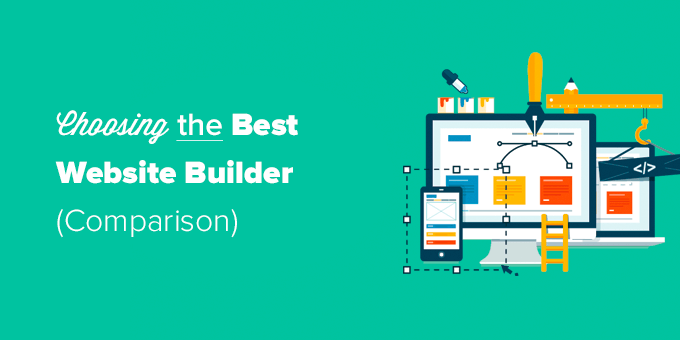
Criteria for My Best Website Builder Review
Over the last 16 years, I have tested just about every website builder on the market, and I regularly test new ones to stay on top of the latest tech.
I look at several different criteria when reviewing the best website builder for each use case, but my top five elements are:
- Ease of Use – I want to ensure that the website builder is easy to use for absolute beginners (non-techy users). It must come with a customizable drag-and-drop builder, powerful editing tools, and other design customization options.
- Pricing – Since it’s a competitive space, I look at which website builder offers the most value for the price. I ask questions like does it offer a free domain, free SSL, free business email, free eCommerce features, and so on. If not, then how much would a small business owner have to spend on additional extras / hidden costs?
- Design & Features – I want to ensure that the website builder offers a good selection of professional website templates along with the flexibility to add additional features like Google Analytics, CRM, third-party marketing tools, etc.
- Customer Support – While I expect website builder software to offer an intuitive, user-friendly interface, I also want to make sure that 24/7 customer support is available when needed.
- Data ownership & portability – Often, beginners don’t think about this, but being in the industry for over two decades, I pay extra attention to terms of service and privacy policies to ensure that you own your data and it’s portable in case you need to switch platforms.
How I Test and Review Software
As the founder of WPBeginner, I have over 16 years of experience in WordPress, SEO, web hosting, eCommerce, and online marketing. As a WordPress expert, I extensively review each plugin or tool that is featured here and thoroughly test them on real websites. I look at multiple factors, including ease of use, customization options, pricing, and more, to ensure a plugin is the best solution for my readers. To learn more, see my complete editorial process.
That being said, let’s take a look at the best website builder software to start your website without hiring a developer or coding HTML from scratch.
1. WordPress
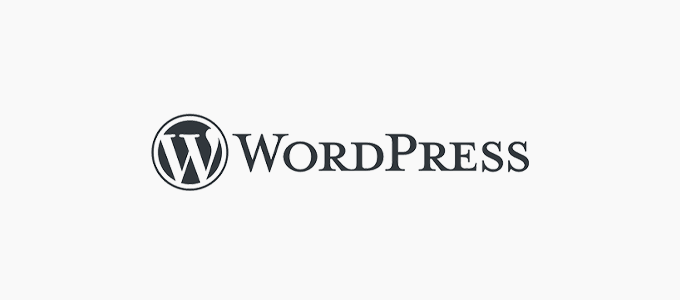
WordPress.org (also known as self-hosted WordPress) is the world’s most popular website-building platform. I’ve been using WordPress since 2006 and I believe it’s by far the best website builder out there.
In fact, 43.5% of all websites on the internet are powered by WordPress. So, I would say that lots of people probably agree with me.
If you’re interested in my in-depth analysis of the platform, here is my complete WordPress review.
Keep in mind that WordPress.org is different from WordPress.com. WordPress.org is a free open source CMS, which needs to be installed on your preferred web hosting server to start building your site. On the other hand, WordPress.com lets you start building a blog right away by signing up for a free account.
I will talk about WordPress.com later in this article. You can also read my WordPress.org vs. WordPress.com comparison for more details.
With WordPress.org, you have full ownership of your website without any third-party control, so it gives you maximum flexibility and privacy.
This is why many popular websites like WhiteHouse.gov (US Government), CNN, The New York Times, Microsoft, and countless other big & small businesses use WordPress as their website builder.
Pros:
As I said, WordPress gives you complete control over every aspect of your website and online presence. It can be used to build any kind of website. For example, an eCommerce store, community forums, a social network, a membership website for selling courses, a business / corporate website, landing pages, and more.
There are thousands of high-quality pre-made WordPress themes that you can use for your website’s design.
You can even use the WordPress content editor not just for creating your pages and posts but for the entire site. That includes the header, footer, sidebar, and more.
Another big advantage of WordPress is that you get access to more than 60,000 free WordPress plugins.
Plugins are like apps for WordPress that let you add extra features and functionality to your website, such as a shopping cart, contact forms, Google Analytics, a photo gallery, social media tools, live chat, CRM, CSS customization, etc.
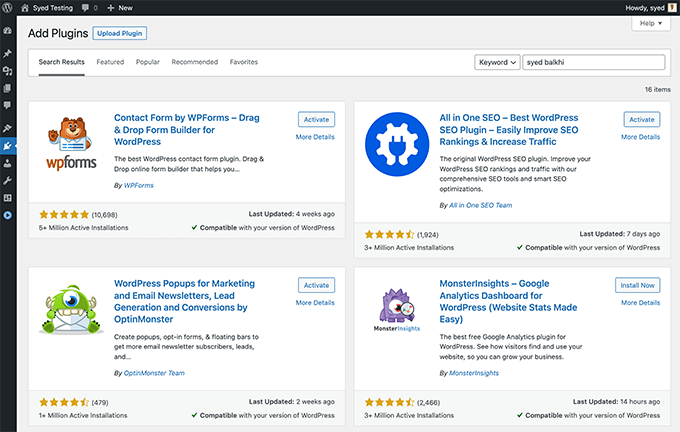
WordPress plugins also make it easy for you to connect & integrate your website with popular business tools. That way, you can automate and streamline your daily operations.
Another big reason why WordPress is popular across the world is that its website builder is fully translated into over 75+ languages, and it allows you to easily create multilingual websites.
When you consider all the above benefits, WordPress is by far the most powerful website builder in the market.
It also comes with robust SEO tools that search engines love, and this ensures your website will always get the highest rankings in search results. I use and recommend the All in One SEO plugin for WordPress because it will help you outrank your competitors in Google.
For all the reasons above, I rate WordPress as the #1 website builder and content management system for business owners, bloggers, web developers, and web designers.
Cons:
You will have to manage your own website, which means you will need to familiarize yourself with a new system. This slight learning curve is easily overcome by most users, but it does feel a bit difficult in the beginning.
You will also have to keep up with WordPress core and plugin updates and create website backups. All of this can be automated by your WordPress hosting provider.
Pricing:
While WordPress is a free website builder, you will need a domain name and web hosting to get your website live, which typically costs $14.99/year and $7.99 per month, respectively.
Fortunately, I have worked out a special deal for WPBeginner readers. You can start a website for only $1.99 per month with Bluehost, an official WordPress-recommended hosting provider. They are offering my readers up to 83% off on web hosting that comes with a free SSL certificate, free domain name, great uptime, and 24/7 phone support.
With this special pricing, WordPress is one of the cheapest website builders on this list for small businesses.
For more details, see my guide on how to make a website with step-by-step instructions (including a video tutorial).
Note: WordPress works with all popular web hosting services, and it’s actually recommended by many other companies, including GoDaddy, SiteGround, DreamHost, Hostinger, and more.
Ready to get started but don’t have a business name idea yet? Use my smart AI-powered business name generator tool to come up with your brand name idea.
2. Wix

Wix.com is a popular cloud-based website builder software favorite among smaller business owners who need a simple site.
In my experience, what makes Wix stand out is their powerful AI features and easy drag & drop design customizer for websites. They also have a lot of templates too.
Wix lets you start building your website for free without entering your credit card information although the eCommerce plans can get quite costly.
Pros
Wix website creator is a fully hosted platform, so you will not have to pay for separate hosting. You get access to hundreds of templates to choose from for your website’s design. Each template is fully editable with its intuitive drag-and-drop site builder.

Wix has also built an artificial design intelligence (Wix ADI) that can design a beautiful website for you.
Aside from tons of templates, Wix also comes with dozens of free and paid apps that you can install on your website. These apps allow you to add new features and functionality to your website. Some of them are created by Wix, and others are created by third-party developers.
Wix offers a free plan with limited bandwidth and storage. However, you can use this plan to test drive their drag-and-drop website builder. It does not include a domain name, so if you decide to keep your website, then you may want to upgrade to a premium plan.
You also get a free SSL with all Wix plans, but you will need to turn it on for your website.
Cons
Free and Connect Domain plans will show Wix-branded ads on your website. You’ll need to upgrade to their Core or Business plan to remove those ads.
If you ever decide to move your website away from Wix, then you will find it quite complicated to do so.
Pricing
Wix premium plans start at $17 per month and will get you a free domain name. The basic eCommerce plan for online stores starts at $29 per month.
If you are interested in how it stacks up against WordPress, then see my comparison of Wix vs. WordPress.
3. Web.com

Web.com is one of the original and most popular website builders for small businesses. They offer easy-to-use website-building tools at a very affordable price, so anyone can build a website without having to know how to code.
What I liked about Web.com is their support team is very helpful and they have a large selection of templates available. Also if you need help, you can even have their team build a website for you at a very affordable price. This is great for freelancers and consultants because technically you can even outsource work to them for client projects.
Pros
Web.com offers a powerful drag-and-drop web builder that’s beginner-friendly and suitable for non-techy business owners.
You can pick from their thousands of beautiful pre-made website templates and customize the design to match your brand needs in just a few clicks.
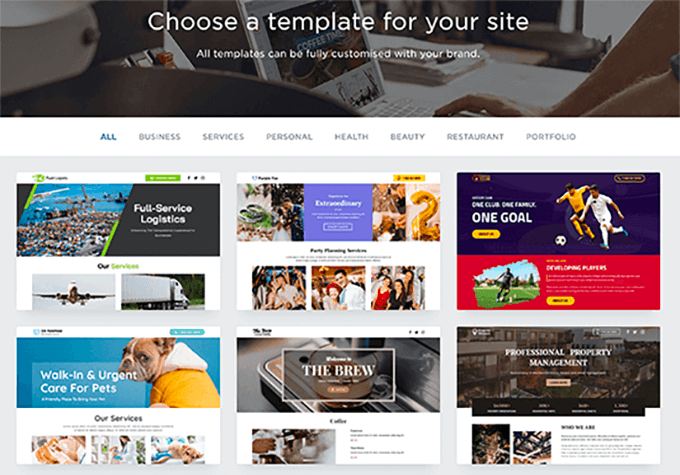
The builder comes with all the powerful features you would expect, including the ability to add photo galleries, videos, testimonial sliders, contact forms, map locations, social media buttons, and more.
You can add unlimited pages to your website and customize the design of each website page individually. All their website templates are 100% mobile-friendly, and they also let you customize the design for different devices (desktop, tablet, and mobile devices).
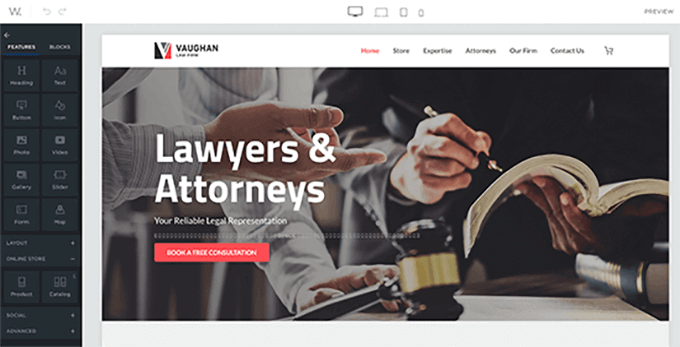
Their eCommerce tools let you add up to 50 products, securely accept credit card payments online, track & manage orders, offer discounts, and more.
All Web.com plans come with a free domain name, business email address, autosave & backup features, website security solution, SEO tools, website analytics, and other powerful website tools.
They also offer unlimited chat and phone support, so you can talk to their web experts when you need help.
Aside from the website builder, they also offer custom web design services where an expert can design your entire website at a very affordable price.
Cons
While Web.com offers all the tools you need to build a small business website, it lacks some of the powerful features that you may want as your business grows.
For example, the blogging functionality on Web.com is very limited and nowhere close to the power of what you get with WordPress.
Their eCommerce plan restricts you to only 50 products, which is more than enough for most small businesses. However, if you’re looking to create a larger online store, then you may want to look at other website builders on my list, such as WooCommerce or Shopify.
Lastly, since Web.com is a proprietary website builder, you cannot easily switch to a different platform if you want to do so in the future.
Pricing
Web.com pricing starts at $1.95 per month for their website starter plan, which comes with their drag-and-drop website builder, hundreds of beautiful templates, thousands of stock images, and a free domain.
Their Website + Marketing plan starts at $3.95 per month, and it includes additional SEO features to help you rank higher. Lastly, their Online Store plan starts at $9.95 per month, which includes eCommerce tools like the ability to accept credit cards with a secure shopping cart, sell up to 50 products, track & manage your orders, and more.
Web.com site builder allows you to create a business website at a very affordable price.
4. HubSpot Website Builder

HubSpot Website Builder is a powerful content management platform that’s built for marketers and small business owners. It combines the power of their drag-and-drop website builder, marketing automation tools, and CRM so you can deliver a personalized digital experience to your users.
Pros
HubSpot is known for being one of the world’s leading marketing automation and CRM platforms in the world. After listening to small business concerns, they have decided to create an all-in-one website builder that helps you create a website in minutes (without hiring a developer).
You can use their conversion-optimized website templates to quickly build a website that delivers results.
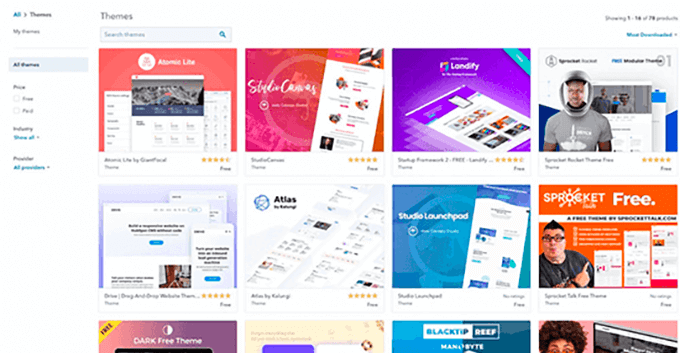
Alternatively, you can use their easy drag-and-drop editor to create a custom website design within minutes.
The best thing about HubSpot’s website builder is that it lets you do adaptive testing, so you can choose up to five variations of a page, and HubSpot will monitor & serve the best-performing option.
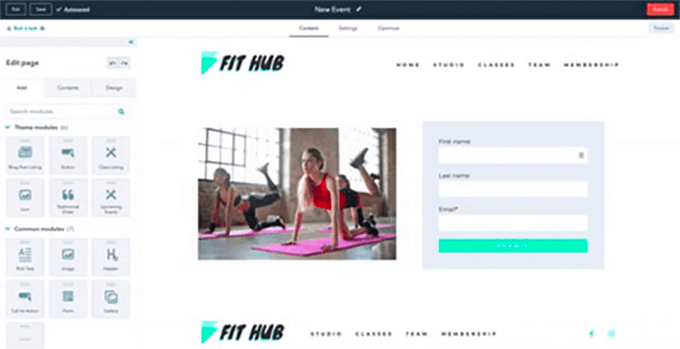
HubSpot website builder seamlessly integrates with their CRM platform, so you can leverage the customer data to create a completely personalized digital experience for each website visitor.
It comes with many other powerful features, including SEO tools, powerful analytics, blogging features, live chat software, email marketing tools, multi-language content support, and more.
Considering the features of their integrated marketing platform, HubSpot is one of the best professional website builders on this list for marketers and small businesses.
Cons
While HubSpot allows marketers to build personalized digital experiences, the platform is best suited for landing pages and simple business websites. For online stores and advanced business websites, you’re better served with WordPress.
The good thing is that HubSpot recognizes this as well, and this is why they have a free WordPress plugin that allows you to seamlessly integrate with WordPress to offer the best of both worlds.
HubSpot is a very powerful platform that comes with a lot of features. This can be intimidating for small business owners who are just getting started. As long as you are committed, their account executives will work with you to ensure that your business succeeds online.
Pricing:
HubSpot offers a powerful free website builder that not only allows you to create a website but also gives you a suite of marketing automation tools like CRM, email marketing, live chat, and more.
You can get started for free, and as your business grows, you can choose from the package that best suits your needs.
Their paid plan prices start from $15 per month for the Content Hub Starter plan, which gives you all their business tools, including CMS (website builder), marketing hub, sales tools, and business operation tools, with increased limits.
All plans come with 24/7 live chat and phone support; their support team is helpful.
HubSpot is a great choice for small businesses who are looking for an integrated website builder platform that has all the small business tools they need.
5. WooCommerce
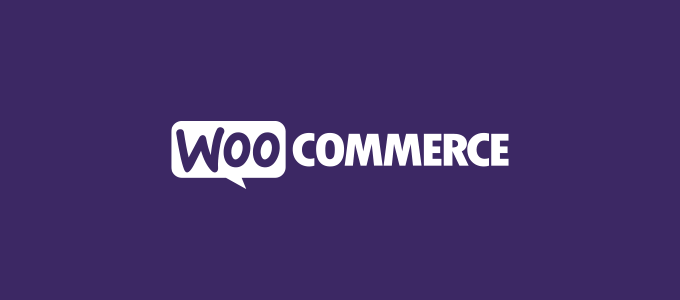
WooCommerce is the most popular eCommerce website builder on the planet to start an online store. It’s an open-source eCommerce software built on top of WordPress.
According to my research, 9.2% of all websites are using WooCommerce as their eCommerce website builder, making it twice as large as Shopify.
Pros
WooCommerce is the best website builder for eCommerce sites because it gives you complete control over your website.
It comes with every feature you could possibly imagine for running a successful online store.
You can accept online payments using WooCommerce Payments or integrate with over 83 other payment options, including Stripe, PayPal, Square, Authorize.net, AmazonPay, AfterPay, Klarna, Apple Pay, Google Pay, and more.
Unlike Shopify, WooCommerce doesn’t charge extra transaction fees if you choose to use other payment solutions, which is great for my international clients who don’t want to be limited to Stripe only.
They also offer dozens of apps / extensions to help you with shipping, delivery, fulfillment, sales tax management, inventory management, and just about every aspect of store management.
You can build custom sales funnels and product landing pages using SeedProd, create an affiliate program using AffiliateWP, show real-time social proof with TrustPulse, offer free shipping or run BOGO deals using Advanced Coupons, set special wholesale prices with Wholesale Suite, add order bumps and upsells with FunnelKit (formerly WooFunnels), and do basically everything else you can imagine.
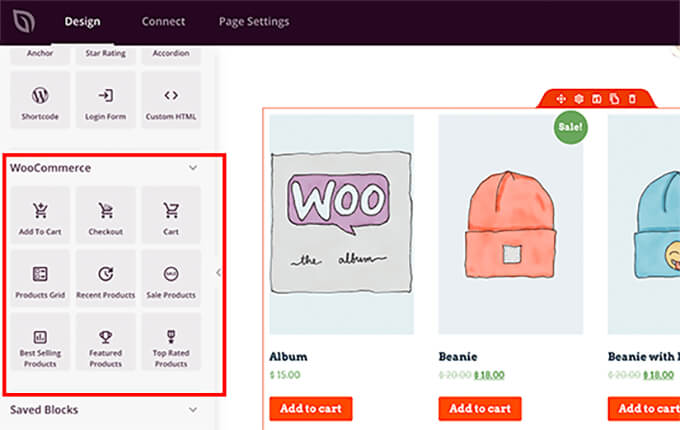
WooCommerce seamlessly integrates with all popular email marketing services, analytics platforms, live chat software, helpdesk software, and conversion optimization tools.
You can reduce cart abandonment and boost sales conversions by adding gamification from the OptinMonster plugin for WooCommerce.
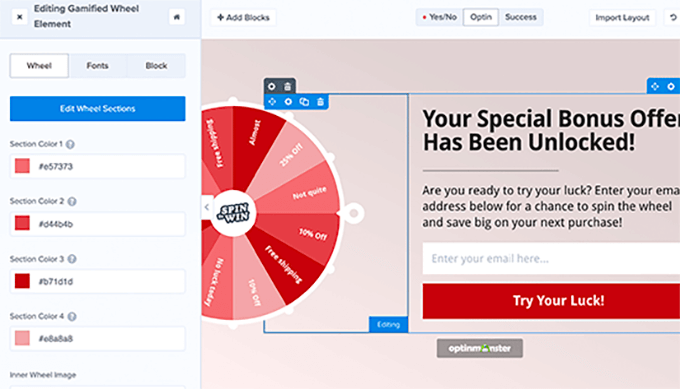
Aside from that, WooCommerce is extremely SEO friendly, and you can further improve your eCommerce SEO by using the AIOSEO plugin.
The freedom and flexibility WooCommerce offers simply cannot be put into words. For more details, see my full list of the best WooCommerce plugins and best WooCommerce themes.
For all the reasons above, I rate WooCommerce as the best website builder for eCommerce.
Cons
Just like WordPress, WooCommerce is a self-hosted eCommerce platform, which means you will need to familiarize yourself with a new system.
You will be responsible for keeping WooCommerce updated, creating website backups, and performing routine website maintenance tasks. That said, most of these tasks can be automated by WooCommerce hosting providers like SiteGround, Bluehost, WP Engine, and others.
Pricing
WooCommerce is a free eCommerce website builder, but you will need a domain name and web hosting to get your online store live.
This cost will vary based on your website traffic and popularity.
You can start as low as $2.99 per month with the SiteGround Startup Plan, which comes with WooCommerce pre-installed, a free SSL certificate, daily website backups, free CDN, auto-updates, and enhanced security.
→ Click here to Claim this Exclusive SiteGround offer ←
Alternatively, you can also use the Bluehost Premium WooCommerce plan, which costs $7.45 per month, but it comes with several premium WooCommerce extensions such as subscriptions, online booking & appointments, and other premium features (valued at over $1000 if you purchased separately).
Really high-traffic WooCommerce site owners often end up using WP Engine for managed WooCommerce hosting, and their pricing starts at $20 per month.
For more details on this, see my complete breakdown of how much eCommerce websites really cost.
6. Hostinger Website Builder (formerly Zyro)

Hostinger Website Builder, formerly Zyro, is a powerful and affordable website builder for beginners. What I really like about them is that they offers an easy-to-use drag & drop website builder solution with free hosting and 81% off premium plans using the WPBeginner Hostinger coupon code.
This makes Hostinger an excellent choice for those looking for a cheap website builder to start their website.
Pros
The Hostinger Website Builder allows you to create a website without design or coding skills. Their easy-to-use and powerful design tools make it easy for anyone to build visually stunning websites.
During my testing, I was really impressed with their AI-powered site builder. I liked the way it automatically set up a professional website based on my answers to a few simple questions.
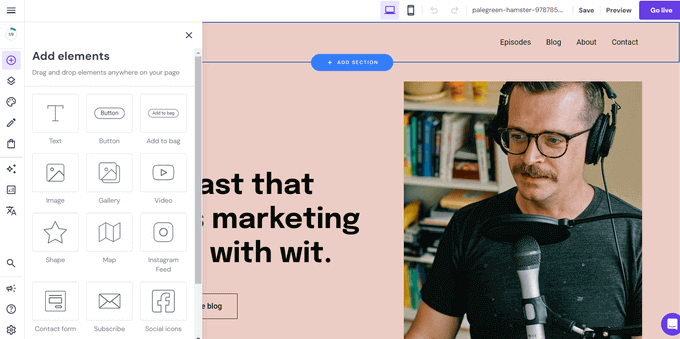
It comes with a logo maker, useful AI writing tools, and 150+ pre-made website templates that you can start with.
You also have access to over 1 million high-quality images for free.
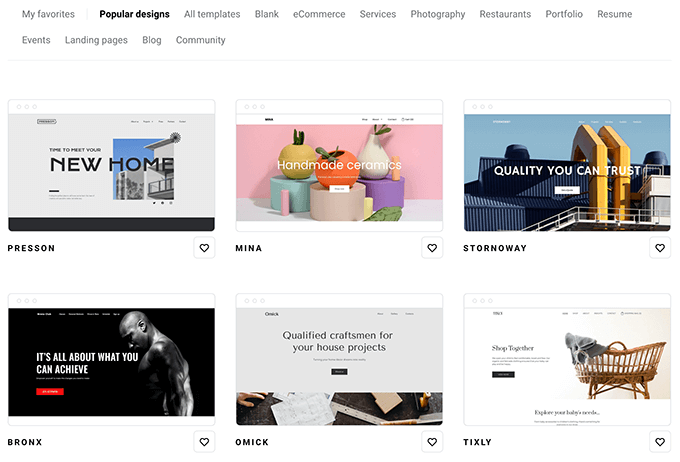
Another thing I liked is its affordable pricing. If you are an artist or a small business on a tight budget, then Hostinger is your best bet. Their website builder pricing starts at $2.69 per month.
But don’t let the low pricing make you think this isn’t a powerful website builder platform. They offer great uptime and reliability.
With each plan, you get new powerful features. For example, on the Premium plan, you get marketing integrations like Google Analytics, Facebook retargeting, visitor remarketing, etc.
They also have eCommerce plans that allow you to add unlimited products, accept online payments, offer discount coupons, order management, inventory management, and even connect your store with Amazon, Instagram, and Shopify.
Cons
It’s not easy to switch templates once you choose one. Also, since Hostinger is not open source, it doesn’t have the third-party integrations and add-ons that WordPress offers.
While Hostinger offers blogging features, it’s not a true blog platform, so it lacks features like the ability to schedule blog posts, etc.
There’s also no free plan, but they offer a 30-day money-back guarantee.
Pricing
Hostinger pricing starts at $2.99 per month. If you want more advanced features, you can upgrade to the Business plan, which starts at $3.99 per month.
You can get a discount on any of these plans using my Hostinger coupon code: wpbeginner.
7. BigCommerce

BigCommerce is a popular eCommerce website builder that allows you to easily create an online store that scales. It comes with all the essential features built-in, so you can keep your overhead low and margins high.
Pros
BigCommerce is a fully hosted eCommerce solution, so you don’t have to worry about website speed, security, or updates. They handle the server and technical side for you so you can focus on growing your business.
Unlike other hosted eCommerce solutions, BigCommerce has native integration with WordPress, which allows you to leverage the flexibility of WordPress while taking advantage of the headless eCommerce power of BigCommerce. Simply put, if you choose this option, your website will be fast and secure no matter how much traffic you get.
BigCommerce integrates with all popular payment gateways, including Stripe (credit cards and ACH), PayPal, Apple Pay, Square, Amazon Pay, Visa Checkout, Chase Pay, Ayden, and more. Unlike Shopify, BigCommerce doesn’t charge a transaction fee for you to use these payment gateways.
You can start with one of their many pre-made website templates and customize it to match your needs using their easy drag-and-drop website builder.
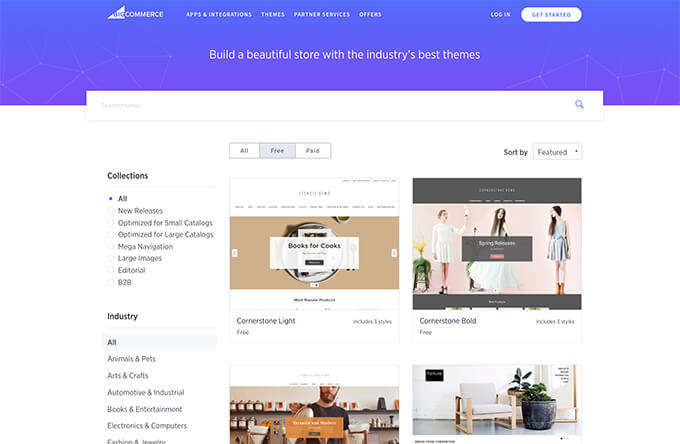
BigCommerce has many built-in features to handle conversion rate optimization, such as cart abandonment, improved product search, product reviews, coupons, and more. You can connect with third-party applications from their app store for additional features.
Pro Tip: You can use the OptinMonster app for BigCommerce to add personalized messages and boost your eCommerce conversion rates.
The best part is their dashboard, which lets you see the metrics to help you confidently grow your business.
Cons
If you are just starting out, you will find BigCommerce pricing a bit higher than that of other website builders.
Since it’s a proprietary platform, migrating away from BigCommerce will be difficult.
Pricing
BigCommerce comes with a 15-day free trial for all plans. Their Standard plan starts at $29 per month, with all the essential features you need. You can upgrade to the Plus plan, which costs $79 per month for additional conversion optimization features. Their Pro plan costs $299 monthly and has all the advanced features you may need.
The best part about BigCommerce when compared to Shopify and other third-party eCommerce platforms, is that they have a seamless integration with WordPress, which can be a huge plus if you want to combine the flexibility of WordPress with the power of BigCommerce.
This is one of the reasons why I have BigCommerce listed as high in my best eCommerce website builder list.
8. Shopify

Shopify is a very popular eCommerce website builder designed specifically for online stores and eCommerce websites. It powers millions of online stores across 175 different countries. Over 400 billion dollars worth of products have been sold on Shopify’s platform.
According to expert research here at WPBeginner, 4.2% of all websites on the internet are using Shopify as their eCommerce website builder.
In my experience, Shopify is great for larger eCommerce stores because they have all the tools and scalability that you need to ensure your online store never crashes. But if you’re a small business owner, then Shopify can get quite costly because their extensions are generally far more expensive than WooCommerce ones.
Pros
Shopify is an all-in-one fully hosted eCommerce software, this means you don’t have to worry about managing software, installing updates, or keeping backups. Shopify does all that for you.
It offers an integrated payment solution called Shopify Payments, which lets you accept credit cards. You can also add third-party payment gateways to accept payments.
As an eCommerce website builder, Shopify comes with full inventory management, unlimited products, powerful stats, and easy marketing solutions, all neatly wrapped under one roof. They have hundreds of designs to choose from, and you will never need to add code.
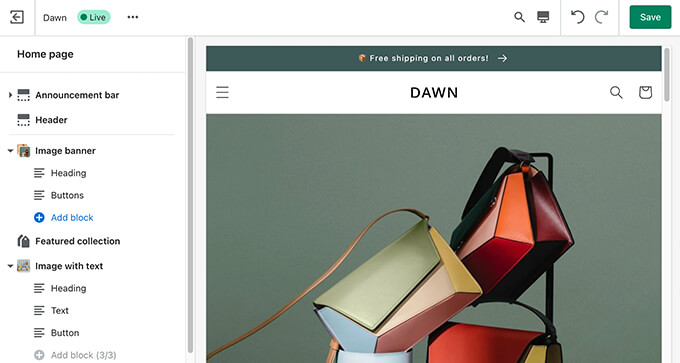
With its intuitive drag-and-drop interface, Shopify makes it super-easy to create a full-fledged online store.
They also offer in-store POS, which allows you to sell products at your location while accepting all credit cards and taking advantage of Shopify’s inventory, shipping, marketing, and stats management tools.
Cons
Shopify forces you to use its Shopify Payment platform. If you want to use your own payment processing solution, they charge an additional 2% transaction fee, which is really high.
If you are just starting out, then you may find Shopify’s pricing a bit higher than some other website builders on this list. For more details, see my Shopify vs. WooCommerce comparison.
If you ever want to move your website away from Shopify, you will find it quite difficult to do so.
Update: Due to popular demand, I have created a step-by-step tutorial on how to switch from Shopify to WooCommerce. My team and I built a free migration tool that does the work for you.
Pricing
Shopify’s Basic plan will cost you $29 per month. You can upgrade it to the Shopify plan for $79 per month or Advanced Shopify for $299 monthly.
If you want a hassle-free eCommerce website builder, then Shopify may be the perfect option for you.
9. WordPress.com

WordPress.com is a blogging platform and website hosting service run by Automattic. It is created by Matt Mullenweg, the co-founder of WordPress open-source software, hence the name WordPress.com.
To learn more, see my article on how are WordPress.com and WordPress.org related.
WordPress.com is not the same as the self-hosted WordPress.org that I mentioned as my #1 website builder. Instead, this is a customized hosting solution primarily focused on blogging. Please see my comparison of WordPress.com vs. WordPress.org for more details.
In the recent years, WordPress.com has really been stepping up their WordPress hosting game. They’re now offering Business and eCommerce plans without restrictions which gives you the flexibility of WordPress.org with the power of their infrastructure.
It’s a nice combination, and I have several clients now using WordPress.com because they don’t want to deal with the headaches of updates, backups, and website monitoring.
Pros
WordPress.com is a website hosting service built on top of the same WordPress software but with a totally custom user experience. You don’t have to worry about the software and backups, as WordPress.com takes care of it.
Their free and paid plans have a different set of features. All plans allow users to choose from hundreds of free and paid WordPress themes. You can then use the built-in customizer to add your site title, use widgets, add navigation menus, and so on.
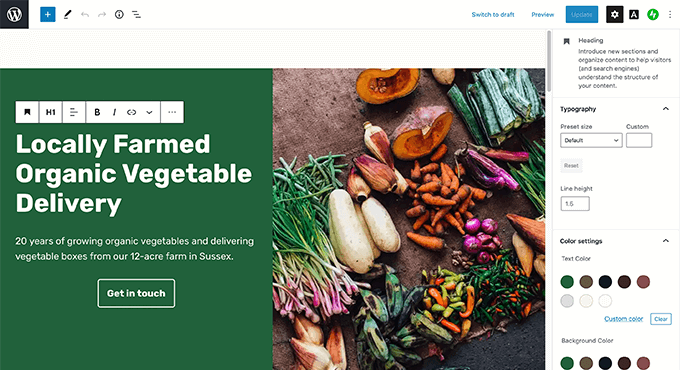
It doesn’t offer the same drag-and-drop functionality as other website builders. However, you can easily customize designs to a certain extent.
It does come with powerful editing tools that bloggers find really helpful.
Cons
You cannot install custom plugins or themes unless you upgrade to their business or eCommerce plan.
Premium and lower plans do not have eCommerce features or third-party ad network support. With the business plan, you can use WooCommerce, install WordPress plugins, and third-party ad networks. However, you will still have to follow WordPress.com’s terms and conditions.
WordPress.com charges a commission for the payment feature. On the free account, this commission is 8% and is separate from payment processing charges. To get rid of the commission, you will need at least the eCommerce plan, which starts at $45 monthly.
Pricing
The WordPress.com free plan is extremely limited. Their Starter plan costs $4 per month, billed annually, and includes a custom domain. The Premium plan costs $8 per month, billed annually, allowing you to monetize your site and advance design customization.
But to really build professional websites, you’ll need either their Business plan ($10 per month) or their eCommerce plan ($22.50 per month), which are far more expensive than self-hosted WordPress.
10. Squarespace
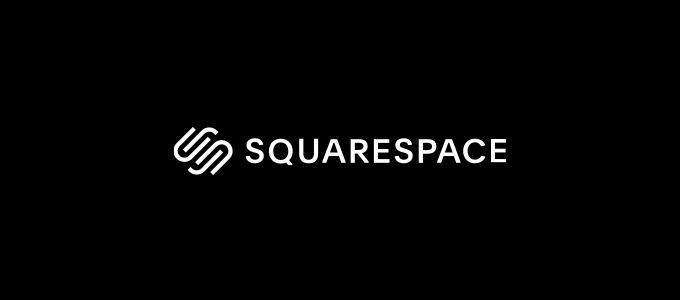
Squarespace is a popular professional website builder known for its great designs and ease of use. According to W3Techs, roughly 1.8% of all websites are built with Squarespace.
Now, I really like Squarespace for building photography websites because their website builder templates and design elements are specifically catered towards creatives. I personally don’t use Squarespace for eCommerce or more complex websites because I feel the platform is a bit limited.
Pros
Squarespace comes with enterprise-grade infrastructure for hosting your website. This secure and robust platform allows you to focus on growing your business without worrying about hosting.
Squarespace includes tons of website designs to get started. All of these designs are completely ready for all types of content. They are fully editable, and Squarespace even allows you to use multiple templates for the same website at once.
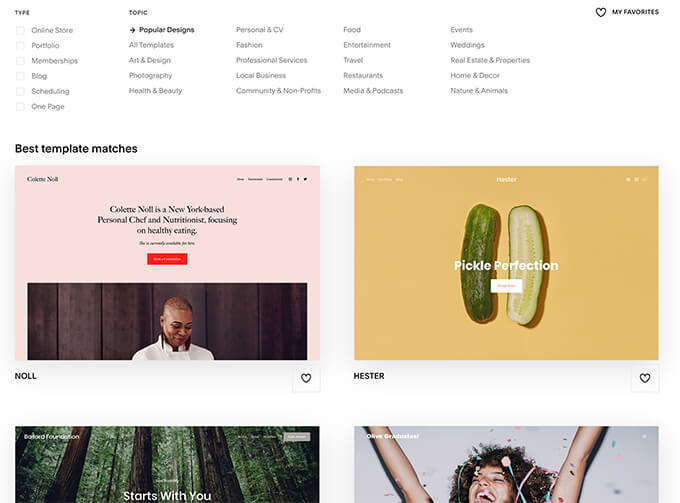
Adding content to your website is very easy on Squarespace. Just point anywhere on your website and start typing.
You can easily drag and drop items on pages to create your own layouts in minutes.

Squarespace also has an eCommerce plan which allows you to add an online store to your website. It offers a friendly interface to manage your products, inventory, orders, coupon discounts, and more.
Cons
Squarespace offers limited integrations with third-party services, which can be a hurdle in growing your business.
Their eCommerce plans only allow Stripe, Apple Pay, and PayPal for payment processing. You cannot add additional payment gateways.
Pricing
Squarespace websites start from $16 per month and $23 per month. Their online stores start from $28 and $52 per month.
Squarespace is a beautifully designed platform that offers very easy-to-use features. It can be perfect if you just want to quickly build a website.
If you are wondering how it stacks up against WordPress, look at my comparison of Squarespace vs. WordPress.
11. Weebly

Weebly is an easy website builder software with tons of great designs and functionality. It includes a beautifully crafted page builder that allows you to edit your website without learning any coding skills.
The popular payment platform Square acquired Weebly to offer a more integrated website builder solution for local businesses.
However in my experience, I feel that Weebly has not kept up to pace with other website builders in the list.
Pros
Weebly is a fully hosted platform, so you don’t need to install and manage any software. They take care of hosting your website and managing all the software that runs on the backend.
It comes with dozens of website designs to use as a starting point for your website. These gorgeous designs are fully editable using Weebly’s live page editor.
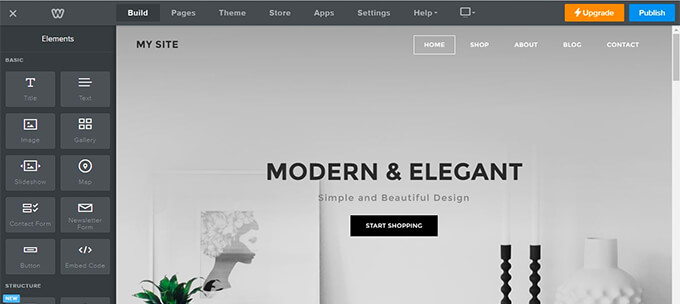
Weebly also comes with built-in support for eCommerce. This allows you to easily create an online store and start selling.
Each Weebly site has built-in features for contact forms, photo galleries, sliders, and more. This allows you to easily add features to your website without any complicated setup process.
Given the ease of use and great features, Weebly is consistently rated among the best DIY website builders for beginners.
Cons
Weebly.com offers a fully hosted platform, so you are locked into the features they offer. You cannot hire a developer or designer to add new functionality or features to your website.
Weebly will show Square ads on your site on both Free and Personal plans. You have to upgrade to their Professional plan to remove ads.
Pricing
Weebly comes with a very basic free plan. Their paid plans start from $10 per month, billed annually. The Professional plan costs $12 per month, and the Performance plan costs $26 per month.
If you are wondering how it stacks up against WordPress, then check out my comparison of Weebly vs. WordPress.
Often beginners start with Weebly and then end up wanting to switch to WordPress. To help with that, my team and I have created a free importer tool called WeeblytoWP that lets you easily move from Weebly to WordPress.
12. DreamHost Website Builder

Next up, let’s take a look at Dreamhost’s Liftoff AI Website Builder. If you’re hoping to use AI to fast-track your website-building process, then this may be the choice for you.
Liftoff AI Website Builder is built on top of WordPress, and is available as part of all DreamHost hosting plans, which start as low as $2.59 / month with a free domain. This makes it one of the cheapest website builders on my list.
Pros
Using artificial intelligence, DreamHost’s Liftoff AI Website Builder creates your website in just a few minutes. It can use AI to generate website templates based on the user’s niche, goals, or preferences. This ensures that the design is tailored to your specific needs without the hassle of starting from scratch.
During the WordPress installation, simply select the AI website builder option. The AI will then show a prompt asking you to provide your website’s name, niche, and business goals.
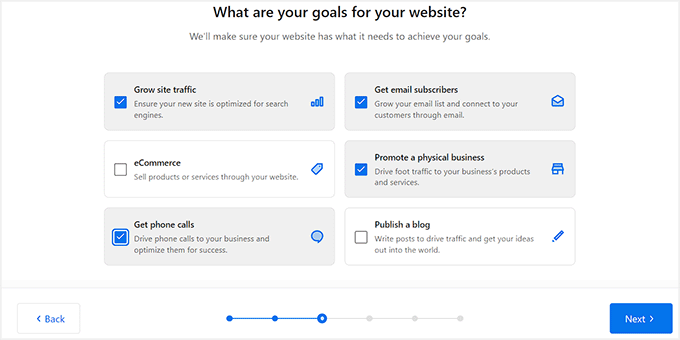
Next, it will display a list of templates tailored to your niche, and you will be asked to pick one.
You can also give a brief description of your website, and the AI will generate some demo website copy accordingly.
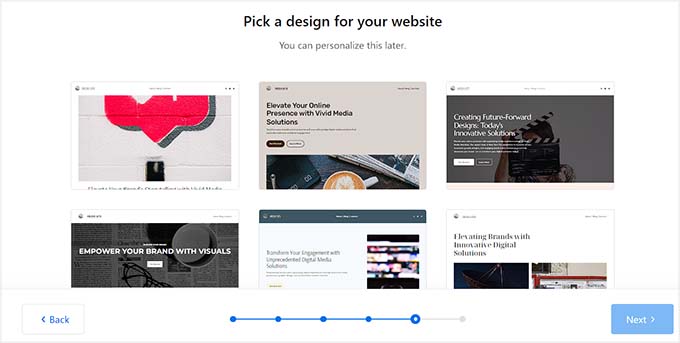
Once that’s finished, your WordPress dashboard will appear.
At this point, you need to visit the ‘Site Assistant’ page.
You can now use the AI website builder to customize your pages, upload a logo, edit the homepage, adjust site descriptions, add navigation menus, and much more.
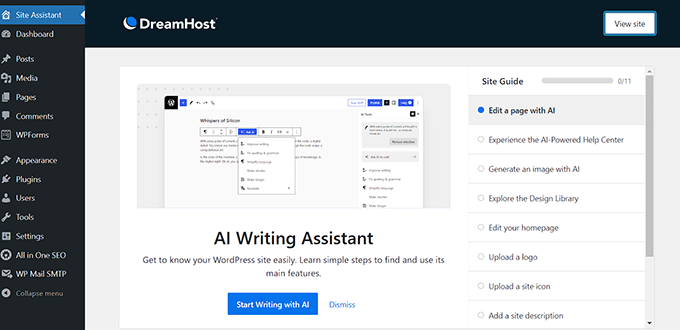
One thing that stood out to me when testing was that you can generate images directly within the WordPress editor and create website copy using AI. You can also select from free stock photos.
The platform offers regular updates and improvements, ensuring your website stays up-to-date with the latest design trends, security patches, and performance optimizations without requiring any manual work.
The Liftoff AI Website Builder even has built-in analytics to help track visitor behavior. I was impressed by the fact that it also includes SEO tools to improve a website’s visibility with AI-driven suggestions for meta tags, keywords, and content.
Overall, this site builder can be used to create any type of website with a custom domain name. Since it’s built on WordPress, it’s easy to add blogging functionality, social media integration, eCommerce features, and more.
Plus, all the premade templates and themes are ready for WooCommerce. This allows you to easily create a storefront using their drag-and-drop website builder (see my list of the best WooCommerce hosting companies).
Cons
DreamHost’s Liftoff AI Website Builder runs on top of WordPress, so you will still need a self-hosted WordPress.org website to use it.
That said, WordPress comes pre-installed with all DreamHost plans. You also get other powerful features included with DreamHost.
DreamHost does not have a free plan, but they offer a 97-day money-back guarantee.
Pricing
The Liftoff AI Website Builder is available as part of all DreamHost plans starting as low as $2.59 per month for one website.
WPBeginner readers also get a free domain, free SSL certificate, and free domain privacy with the Starter DreamHost plan, which also comes with a 97-day money-back guarantee.
This makes DreamHost one of the most affordable website builders on the market.
13. GoDaddy Website Builder

GoDaddy is one of the largest domain name registrars and web hosting service providers in the world. While many business owners use GoDaddy to host WordPress websites, they also offer a simple online website builder for those who don’t want to use WordPress.
Pros
GoDaddy Website Builder is a simple and easy tool to create professional-looking websites. It comes pre-loaded with several ready-to-use blocks that you can drag and drop to build different layouts.
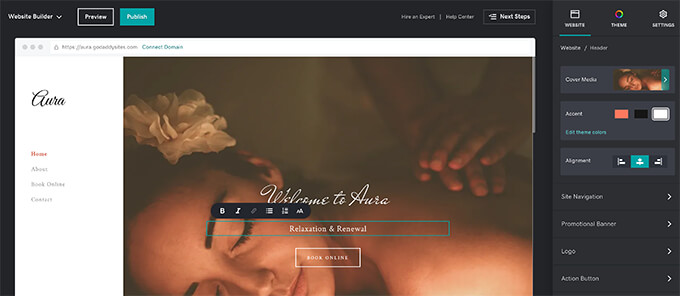
It also has an integrated photo library with professional images from Getty Photography that you can use on your website. You can also upload your own photos and create image galleries.
GoDaddy website builder works on smaller screens too. This allows you to work on your website on the go using your mobile phone or tablet.
Cons
It is not as feature-rich and flexible as most other website builders on this list. It offers a limited set of features with fewer design options.
It is quite difficult to move your website from GoDaddy Website Builder to WordPress.
Pricing
GoDaddy website builder pricing starts at $10.99/month for the Basic plan, $14.99/month for the Premium plan, and $20.99/month for the Commerce plan. All plans are billed annually.
GoDaddy Website Builder can be used for a simple website with a few pages. However, it is not a good choice to build content-rich websites.
Video Guide: Best Website Builders
Here’s a video guide that explains how to choose the best website builder
Conclusion: Which is The Best Website Builder?
WordPress.org is the best website builder. After evaluating all top online website builders, I believe that it outperforms all of them in overall performance, ease of use, price, and flexibility.
WordPress is an excellent choice for beginners, personal blogs, and business websites. Some of the world’s top brands are using it on their websites. See all the reasons to choose WordPress as your website builder.
If you want to build your website with the best website builder, then get started with WordPress by using Bluehost. It is my #1 choice.
You can read my step-by-step guide on how to make a website for detailed instructions.
Looking for business name ideas? Try my AI-powered business name generator tool to find creative brand name ideas.
If you are looking to build an online store (eCommerce website), I recommend WooCommerce as the best eCommerce website builder because it offers all the features that you will need at the best price.
If you want a WordPress alternative, then I recommend using either Wix or HubSpot.
HubSpot offers a free website builder along with a suite of marketing automation and CRM tools to grow your business. It also seamlessly integrates with WordPress should you want to switch later.
Wix offers a free AI powered website builder that’s great for small business websites.
I hope that my website builder reviews help you choose the best website builder for your project. You may also want to see my list of tools to help you grow your website.
Website Builder FAQs
Having helped over 2 million+ users start their websites, I have answered quite a lot of questions. Below are some of the answers to the most frequently asked questions about website builders.
Are website builders worth it?
Yes, overall, website builders are an extremely cost-efficient way to build a website. Instead of paying thousands of dollars to hire a web developer, you can use the easy-to-use drag-and-drop interface that website builders offer to build your own website for a low monthly fee.
Which website builder software do professional web designers use?
These days, even professional web designers use a website builder like WordPress to build their client websites because they can build any type of website using WordPress plugins and themes.
Drag-and-drop WordPress page builders make it easy for professional web designers to create custom websites for clients while saving time, which allows them to serve more clients and make more money each month.
Is it better to code your own website than use a website builder?
In the past, knowing how to code a website from scratch was worth it, but these days, almost all professional developers and designers use a website builder platform or open-source CMS software to build websites.
Website builder platforms have gotten really good, and they simply let you do more in less time. To learn more, see our guide on website builders vs manual coding.
Can I switch my website builder software later?
No, with the exception of WordPress, most website builders make it really hard to switch away from them. This is why it’s extremely important to choose the right website builder that you can grow with.
There are third-party services, tools, and tutorials that can help you switch website builder software with varying degrees of success.
For example, you can use my Weebly to WordPress migrator to switch from Weebly to WordPress.
I also have detailed tutorials on:
- How to switch from WordPress.com to WordPress.org
- How to switch from Blogger to WordPress
- How to switch from Wix to WordPress
- How to move from Squarespace to WordPress
- How to move from GoDaddy website builder to WordPress
- How to move from Joomla to WordPress
- How to move from Medium to WordPress
- How to move from Shopify to WooCommerce
Is WordPress really free? What’s the catch?
Yes, WordPress.org is an open source software that’s 100% free for everyone to use. It’s built by a community of developers under the guidance of the non-profit WordPress foundation.
WordPress is licensed under GPL, which means anyone can use it, modify it, and redistribute it. It gives you full freedom and ownership over your website content.
The only catch is that to use WordPress, you need to have a domain name and web hosting, which is true for all websites.
You can learn more about why WordPress is free and what are the costs.
How can I create my own website for free?
If you want to start a website for free, then you can use HubSpot Website Builder. You can sign up for a free account (no credit card needed).
You can use their smart templates and drag-and-drop editor to create a completely custom web design.
They also offer powerful business tools such as CRM, email marketing, live chat, marketing automation, and more, so you can quickly grow your online presence.
How can I get a free domain name?
The best way to get a free domain name is to choose a website builder platform that offers a free domain as part of their paid plan.
Here are the best website builder platforms that offer a free custom domain:
- WordPress hosted on Bluehost
- Hostinger Website Builder
- DreamHost AI Website Builder
- Web.com website builder
For more details, see my guide on how to register a domain name for free.
Do I need a custom domain to build a website?
No, you do not need a custom domain to build a website, but having one does help boost your credibility.
Often, free website builders will give you a branded subdomain like yoursite.wix.com, but this does not look professional.
This is why I recommend everyone get a custom domain name, especially if you’re serious about your online presence.
Do I need to buy web hosting to build a website?
Yes, all websites need web hosting because that’s where your website files are stored. When you purchase a website builder subscription, you’re technically buying web hosting from them.
As your website grows and gets higher traffic, most website builder platforms will ask you to upgrade your subscription to a higher plan.
See my comparison of the best WordPress hosting companies for more details.
Are there any hidden costs to building a website?
The hidden costs of building any website are addon services such as email marketing services, business phone services, a professional business email address, SEO tools, and other third-party extensions / apps that you may need (varies based on the type of site).
I have written a detailed guide on how much it costs to build a WordPress site (with tips on how to keep it low budget).
Other typical hidden costs in website builders are storage space, bandwidth, domain renewal costs after the first year, higher renewal pricing on some platforms, and aggressive upsell from the sales team.
Which is the best website builder for SEO?
I believe that WordPress is the best website builder for SEO. I use it to build all my websites, and I’m not alone.
Every SEO expert agrees that WordPress is the most SEO-friendly website builder, and this is why over 43% of all websites use WordPress.
Learn how to make a WordPress website (step by step).
Which is the best website builder for eCommerce?
Just about every website builder claims to have eCommerce features, but I believe that WooCommerce (WordPress), BigCommerce, and Shopify are the best website builders for eCommerce.
Which is the best website builder for A/B testing?
You can do A/B testing on just about every website builder. To do this, you’d need third-party tools like OptinMonster, Google Optimize, etc.
Some website builders like WordPress, Shopify, and BigCommerce make it easy to set up A/B testing when compared to others.
What is the best website builder for small businesses?
The best website builders for small businesses are WordPress, Wix, and HubSpot. If you’re looking for an eCommerce website builder for small business, then I recommend using WooCommerce.
Are there any website builders in this list that you would personally avoid?
I typically do not like closed website builder platforms because they lock you in and make it harder to switch. If I had to pick one to avoid, then I’d say avoid Wix because it’s the hardest platform to switch away from. They also aggressively try to upsell every step of the way.
I’ve been building websites since 1998 and have tried many platforms. For the last decade, I have always favored WordPress because it’s open source and gives you full ownership of your content.
What is the best tool to create a website?
The best tool to create your website is WordPress, along with the design tool SeedProd which lets you build your website using a complete drag-and-drop interface (no coding needed). You can use SeedProd to create completely custom WordPress themes and layouts with just point and click.
For a more comprehensive list of design tools, see my comparison of the best web design tools.
Why is WordPress so popular?
WordPress is the most popular website builder, used by over 43%, of all websites because it’s easy to use and flexible enough to make different types of sites. That’s the main reason why WordPress has grown so much in popularity.
For more details, see my complete guide on the most important reasons to use WordPress.
Which are the top 3 best website builders?
My top 3 choices for the best website builder software are:
- WordPress – Best website builder (overall).
- Wix – Best website builder for simple small business websites.
- WooCommerce – Best eCommerce website builder for online stores.
No, this last question is not a joke. I seriously get this question even after referring people to this guide.
What is the best company to use to build a website?
As I mentioned previously, I think the best website builders are WordPress, Wix, and WooCommerce.
However, if you’re searching for a website development company to build a website for you, I recommend WPBeginner Pro Services. It offers custom WordPress web design services at very affordable pricing.
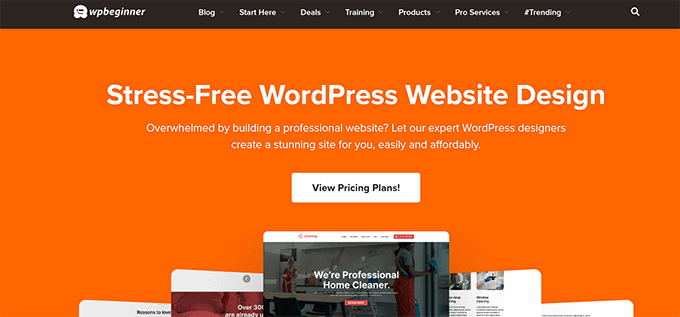
The website design service includes a dedicated project manager, bespoke homepage design, blog setup, SEO optimization, and more. It’s a great solution for people that don’t have the technical skills or the time to create a professional website.
Disclaimer: To help avoid choice paralysis, I only compared the top 13 best website builder platforms. This list doesn’t include other website builder software like Site123, Duda, Jimdo, SiteBuilder, Webflow, Format, Carrd, Ucraft, Google Sites, Webs, IONOS by 1&1, Adobe Muse, Yola, Webnode, etc because I believe the solutions mentioned in this article are simply better.
If you liked this article, then please subscribe to our YouTube Channel for WordPress video tutorials. You can also find us on Twitter and Facebook.





Betsy Perez
Great article. I am undecided on what I really need to run an online small business for handmade diaper cakes, baby shower and weddings crafts including invitations and etc. Any suggestions?
WPBeginner Support
As a WordPress tutorial site, our opinion tends to be biased toward WordPress
Admin
Vivien
My boss wants me to create a simple elegant website for his jewellery business customers to view. No e-commerce function needed. Every jewellery piece has a code. He needs the ability to type that code into his online website to bring that jewellery piece up into view.
I’ve got enough computer literacy to admit that I know nothing about databases and prefer website templates that aren’t too rigid when it comes to the placement of text and/or graphics.
Any suggestions?
WPBeginner Support
You could create a custom post type for the pieces so they can be searched: https://www.wpbeginner.com/wp-tutorials/how-to-create-custom-post-types-in-wordpress/
Admin
Shiri
Thank you for the article! It was very informative even with the bent. I want to create a website that is essentially a digital library. I want to be able to charge to use the site but not actually sell anything on the site itself. Could I actually create something like this with WordPress?
WPBeginner Support
For what it sounds like you’re wanting, you would want to create a membership site using a plugin from our article here: https://www.wpbeginner.com/plugins/5-best-wordpress-membership-plugins-compared/
Admin
voGGio
Great article! Even with the bias the pros and cons on all options seems well thought of.
I have been a long time ecomm lurker, but recently felt the need to do more research and actually start, this gave some clarity.
I recently read about bluehost.com(might have been here somewhere?) – this seems like a great offer as well.
My biggest concern is the speed of all these platforms, and how mobile site viewing is compared. This is holding me back on pulling the trigger and starting.
Keep on banging out these wonderful write-ups @Editorial staff.
WPBeginner Support
Thank you for the feedback and kind words
Admin
Joseph Bosteder
Hey thank you so much for this article! It was really helpful. I do have a question regarding what platform I should use for my business venture though. I currently have a premium plan with Wix that I use to promote myself as an artist/ performer. I have loved working with Wix, but I am starting a marketing business online and want something that allows me to build websites for other businesses quickly, and be able to do a broad range of things since I would be building for other people I would need that flexibility. Also does Wix or Wordpress offer any sort of click funnel? Thank you and look forward to hearing from you soon.
WPBeginner Support
It would depend on what you’re looking for in terms of your click funnel, for a starting point you may want to take a look at OptinMonster.
Admin
Prakash
I had a website with domain and hosting at godaddy. My site was deleted completely by godaddy due to a problem in payment processing of my hosting fees. I do have a backup of that website on my desktop. My domain is still registered with godaddy. My question is: I want to revise my site on my desktop before uploading to any hosting provider. I want to make it a responsive design and mobile friendly site. How can I do the revision of my old site on my desktop so that I can finally upload it to my hosting provider?
WPBeginner Support
You can follow our guide to install WordPress locally on your computer here: https://www.wpbeginner.com/how-to-install-wordpress/#installlocal
Admin
Brandi
Hello,
I am looking to build a website that serves as a flight deal hub. I want the main content of my site to feature daily flight deals aggregated from multiple external websites. I’m not sure what the technical term is called, but are there any web platforms on this list that would enable me to have content from other websites automatically uploaded on my website?
WPBeginner Support
From the sound of what you’re wanting, you would want to take a look at RSS aggregators: https://www.wpbeginner.com/plugins/how-to-create-an-autoblog-in-wordpress/
Admin
Prabin
How to create a new e-commerce website like Amazon ?
WPBeginner Support
You would start by creating a store which we have an article on how to do here: https://www.wpbeginner.com/wp-tutorials/how-to-start-an-online-store/
Once you set that up you can use dropshipping for functionality similar to Amazon.
Admin
hayley
im currently with wix but looking for a website that supports afterpay or zippay? thanks
WPBeginner Support
You would want to check with the support for ecommerce plugins if they have an integration depending on what you’re wanting to accept payment for: https://www.wpbeginner.com/plugins/best-wordpress-ecommerce-plugins-compared/
Admin
Drexler
Thank you for a great article.
I’m just starting my therapy practice and I want to just promote myself with few videos and posts and connect them to Facebook and other social networks.
I can’t see myself selling anything from website.
What would you suggest?
WP seems to be the strongest platform but I really don’t know much about site maintenance and those drag and drop platforms look appealing.
WPBeginner Support
As we are a WordPress tutorial site we are slightly biased toward WordPress but WP should be able to handle what you’re wanting to do
Admin
Tracy Lee
So very thankful to find this article!! I have been using Blogger for two weeks and am finding it so plain and am ready to upgrade to a real site. It is possible to move an existing Blogger site to WordPress? I also already have a domain purchased from Google, would I need to purchase a new one when I sign up for a hosting site? I’m so ready to go with a more professional looking blog that doesn’t show up as a blogspot URL. Thank you again….
WPBeginner Support
Yes you can move an existing site to WordPress, we have an article covering the steps involved here: https://www.wpbeginner.com/wp-tutorials/how-to-switch-from-blogger-to-wordpress-without-losing-google-rankings/
Admin
Sherry Pierce
Starting a website that I prefer would be hosted with security features… a combination blog/website with “tab” for online store for a few items (or that would link to an Etsy store) accepting payments by Paypal, Visa/Mastercard. Also a “tab/dropdown” for ability to select videos that I will be posting on you-tube. I don’t want to do any coding, so drag and drop to a template plus ability to add in my own photos and SSL certificate are primary concerns. Is this all possible with wordpress choices?
WPBeginner Support
Yes, with plugins you are able to do that with WordPress. For the tab for YouTube, I am unsure what you mean.
Admin
maryam
best article, i want to have corporate site and its design is very important for me
, which theme is better for corporate site
WPBeginner Support
For questions about themes, you would want to take a look at our different theme articles: https://www.wpbeginner.com/showcase/best-corporate-wordpress-themes/
Admin
Sam
I’m using wix right now for my own personal blog. I know I don’t have my own domain name and the wix add is always on my website, however, the page can still be easily reached and I will be able to add basic content like article entries and videos. Products or merchandise and affiliate links could still also be used without having to pay a premium for a registered domain and hosting service. Pay feature may possibly be enabled as well, depending on how you set it up, so that no percentage would be deducted from sales through the site or from a sales widget.
WPBeginner Support
While you could use affiliate links or link to other locations to sell your products from, to create a store directly on the site you would need their ecommerce plan
Admin
Tia
This is great information, thank you for this article. I’m just being pulled in too many directions with what to chose. I’m building a website for my blog and podcast. I already have a hosting site for my podcast but I also want a site for my blogs and about me for my followers to reference too. I want all my social media links along with my buzzsprout link to my podcast. Which website builder would you recommend? I would like to have a player on my site if possible.
WPBeginner Support
Our recommended website builder will be WordPress, for creating a site like what you’re wanting you would want to take a look at: https://www.wpbeginner.com/wp-tutorials/step-by-step-guide-how-to-start-a-podcast-with-wordpress/
You can skip the steps you have completed but later in the article, it explains how to have embeds on your site
Admin
Favour Joshua
Wow! I love your posts so greatly. You know how to excavate those hidden treasures in WordPress.
I have a question; how can you add big company logos to your website not as picture. For instance; “As featured in Forbes, Yahoo, Entrepreneur. This is my first question and I would cherish immediate response.
WPBeginner Support
There are a few methods to do so, normally through CSS or JS to hide that they are images rather than them not being images. If you take a look at sites using that with inspect element it should give you an idea of how that site is setting it up
https://www.wpbeginner.com/wp-tutorials/basics-of-inspect-element-with-your-wordpress-site/
Admin
BNG Kumar
I want to have my website to promote my Tuition Classes. I would also like to build this website though i have no technical expertise. Should i just blindly go in for Wordpress.com ? I am also confused with this Wordpress.org. Which one should i go for ? Further once the site is up, should i need to promote the site on the internet/on google and what will the associated costs to setup and also the annual maintenance costs ?
WPBeginner Support
For these questions about WordPress, you would want to take a look at our article comparing the two here: https://www.wpbeginner.com/beginners-guide/self-hosted-wordpress-org-vs-free-wordpress-com-infograph/
Admin
jamie
Hi there!
I love your list, but of course you will select WP as the top platform. Hey, I love it too!
I have a Wordpress site that I am seriously considering shutting down. I love that i get to work with my creativity building sites, but I don’t love that I have been in a cycle of getting the site up, after a month or so, I start getting those Jetpack notifications that my site is down, it’s still not loading, it’s back up. I mean I’ve gotten at least 50 in the last couple of days. I can never figure out what’s wrong with the site so I end up stripping or deleting the whole site and and starting over. I don’t use a lot of plugins (the basics security, backup, some kind of form, elementor, etc). I’d really love to believe that the benefits outweigh
I don’t want to leave WP, but I am seriously considering some of those other options. Got any idea out keep Jetpack happy?
WPBeginner Support
Sadly, you would want to reach out to Jetpack for that question, there are multiple possible reasons their plugin could be giving you that warning while your site is still up.
Admin
Mark
I am a designer that wishes to place my portfolio on the web and have the option to accept cryptocurrency as well as fiat currency. What would you recommend?
WPBeginner Support
Depending on the currency, you may want to take a look at: https://www.wpbeginner.com/plugins/how-to-accept-bitcoin-payments-in-wordpress/
Admin
Shaunnette
Hi. I want to start a review site that incorporates videos and actual reviews by normal people. It should have categories and an awesome search function. And allow links back to actual shops. Could you please advise on a theme? Thank you.
WPBeginner Support
While we may not have a review theme at the moment, you should be able to find a theme you like then use plugins to add the functionality you are looking for. You may want to take a look at: https://www.wpbeginner.com/wp-tutorials/how-to-create-a-reviews-site-with-wordpress/
Admin
Rachel Bristowe
Hi
Looking to build a website for a excavation company we just started. Would WP be good for this? It is imperative that we get good Google rankings due to competition in area, does WP automatically do this or do I need to know how technical stuff like how to code etc to get a good ranking?
Thanks
WPBeginner Support
Hi Rachel,
WordPress is powerful and is SEO friendly. However, chances are that most of your competitors will also be using WordPress.
The good news is that there is so much more you can do in WordPress to beat the competition. For instructions, see our ultimate WordPress SEO guide for beginners.
Admin
Ary
Hi I’m tour organizers in Bali I would like to build up my website to get more tours,can I have more info.
Thanks
WPBeginner Support
Hi Ary,
WordPress has tons of plugins that you can use for example manage online bookings, accept credit card payments, display events calendar, sell tour packages and more.
Admin
LEE
Everyone look no further. Just use Wordpress I can see in the comments it’s recommended majority of the time. Also, I have some experience with WordPress and it’s definitely worth trying. It has serval templates and plugins to use. You can also customize it with using a little code.
Raymond Watkins
Nice Blog. Thanks for sharing the best way to choose the Website Builder. I really appreciate your work. Keep up to the great work
Diego Volpe
Hello, first of all amazing job with this article, is full of condensed information, straight to the point. I loved it.
I’m working with a real estate agency, airbnb “wannabe” and I’m doing a research on the most famous and useful website builders, but I still don’t seem to understand if any of these would work to showcase the properties I have in stock for possible tenants. Would you recommend any of these? And, if that’s the case, which one would you recommend?
Thanks a lot in advance!
WPBeginner Support
Hi Diego,
We would recommend WordPress. There are several real estate plugins that can be used to create something similar. how to create a real estate website using WordPress
Admin
Shannon Sequeira
I want to build a website to showcase my work. I’m a baker and cake decorator. And would want a website mainly to display my work to interested parties as well as some terms and conditions that apply on placing an order with me. And just some more photos and general information about myself and my company.
WPBeginner Support
Hi Shannon,
WordPress is perfect for that and many cake decorators and bakers already use it. See our list of best WordPress themes for bakeries for some ideas.
Admin
Alana
Hello I am trying to start a website where I blog and do reviews of products that are of course not my own, just for giving information. I also plan to try and find advertising sponsorship so I can earn some income through my site at the same time, as well as I want to sell a few things I have created myself on the same site. I have zero knowledge of how to build my own site, no skill when it comes to coding or even what it is, and am new to all of this but still want to do so. What should I do and who do I use as the website builder? I want one that does a lot for you easily, but to blog and add my own photos for reviews. To have the ability to accept advertising on my site for revenue, and ability to sell my own items and accept PayPal or another common trusted credit card or online pay service for payment. Please can you give me a detailed answer or advice exactly what company to use? I am not so much concerned with monthly cost as I am with upfront year being paid at once, that’s a lot of money at once for me. Please help?
WPBeginner Support
Hi Alana,
You can do all that using WordPress. You can easily start a blog, online store, or reviews site and then expand it using other plugins and tools.
Admin
Richard Blodgett
At one time I had an online eBay store for about 6 years and did alright but I would like to start another one with merchandise from a company that drop ships everything and has a very extensive catalog. Which website would compliment my eBay store?
WPBeginner Support
Hi Richard,
We would recommend WordPress due to its flexibility.
Admin
Hyguncia
Hi I’m planning to sell men and women clothing /shoes which website that will help me
Nicolas
Wix owns your website and will remove it without notice if it receives any complaint, justified or not.
kerry
Hi. I m looking to start my own food & restaurant blogging. I can not seem to find a website that is easy to install yet make money from..
Bopane
Hi,
Thanks for the article. As new to wehostings, I want to start a discussion blog and sell ads on my website but need a reasonable monthly pricing as a starter, which can you advise. And if I decide to move from one website to another will i be able to stop payment authorisation
jack
Hi guys, found this website and like your article.
What you would recommend is best for a Doctor website? I Want to make a website for my friend who is a doctor to promote him. I do not know much tech but can learn easy. fast learner.
David Sosnovskiy
Hello,
I am planning to create my own contest. This is an online based singing competition based on the popular Eurovision Song Contest. A summary of the contest is this: Fans of the Eurovision Song Contest (ESC) would apply for a spot, they would each represent a country of their choice in Europe, and would choose a contestant from that country that would represent them with a song. I want this contest to be based on all platforms. (Social Media, YouTube, and it’s own website). I am planning a lot of graphics to be added that I will need to create, and there will be polls, and videos from YouTube attached to this page. I want there to be multiple sections of the website, and for it to be accessible both on computer and on mobile. I also want to create a voting section of the website, where fans that aren’t in the contest would be able to vote in the contest as well. I am a beginner to all of this website and graphics stuff, so my intentions may seem very ambitious, but I need a website that could eventually hold all of these things. What would you recommend? I am also on somewhat of a limited budget, so I would like to keep costs as low as I can, but still create a sleek and quality website. Could you please help and give me some input?
WPBeginner Support
Hi David,
Obviously, your website will need extensions to connect with your social media accounts, add voting plugin, save user account details, and more. For all that you will need a platform that can be extended to meet your needs, and WordPress makes all this super easy. You may also be able to find free plugins to do a lot of things which will help you keep the costs in check.
Admin
Kimberly Mitchell
So with most of these, you are billed annually. They won’t let you pay monthly and for those who do like go Daddy, you get restricted on some content to use.. Meaning you can’t use them.
Bridget
So if I purchase my domain names from godaddy, I can’t use them with Wordpress?
WPBeginner Support
You can use your domain on GoDaddy for a WordPress site
Admin
Tawnya Ennis
Thank you for the article. One question as I would like to have an online store on my website , which would be best so I can have two options for payment, one as PayPal and also one for credit card ie Visa/Mastercard check out as well?
WPBeginner Support
Hi Tawyna,
You can have them both, this gives your users more options to purchase.
Admin
Mark
Hi!
I want to create a website that promotes a drugless, non-surgical service for patients in pain and weekend warriors. I want my site to have video testimonials, information about services, inquiries for consultations and possibly the ability to schedule appointment for service. Essentially we need a web presence for this service that drives traffic to us, demands them to take action to increase sales (who doesn’t, right?) Recommendations? Thanks.
WPBeginner Support
Hi Mark,
We will recommend WordPress.org. It gives you access to all the features you need videos, testimonials, services, and more. It is flexible enough to accommodate changes you will need in the future as your website grows.
Admin
Heather Walsh
I’m looking to create a website for my home cleaning business. I’d love a clean looking website (no outside ads cluttering it), with the option for clients to easily pay online for services. I’m somewhat tech savy but don’t speak tech lingo and would love an easy to navigate & manage website builder. Which builders do you recommend?
WPBeginner Support
Hi Heather,
We will recommend WordPress. It not only allows you to create clean beautiful websites, you can also use it to sell services online.
Admin
Tyesha Sosa
Hi,
I’m currently using WIX.com to create my CPT & fitness nutrition specialist web page. For some reason I saw theses other options and now I have choices. Also I sell nutrition but addition of having a store I would like to have link also to connect people to the nutrition web page. which web page builder is better option for me?
W. James Rapp
So far I have not yet found ANY of the DIY platforms that can complete the functionality of my simple website. Without the required payment method that my site needs I can not use ANY of these DIY platforms.
tine bhatia
i am launching a line of fine jewelry and would like to have the option to sell from my website.
my current hosting is media temple.
which builder should i go with?
WPBeginner Support
Hi,
We recommend using WordPress with WooCommerce. See our guide on how to start an online store for step by step instructions.
Admin
Ferdinand
Please. i am a graphic designer and i wish to build a website to showcase my jobs and also talk about my brand. What website builder do you advise i use ? Have it in mind that i have little knowledge about website designs and all.
WPBeginner Support
Hi Ferdinand,
We will recommend WordPress.org, it has tons of themes (website designs) some are designed specifically to create a portfolio website.
Admin
omen
hi, i want to build a website for on line technical training ( i being the trainer) for students. i have my own designs and contents without much major changes in the future. which platform should i choose?
WPBeginner Support
Hi,
We would recommend using WordPress. It comes with great membership and LMS plugins that will help you offer courses and training materials more easily.
Admin
Ian Boniface
Does WordPress, or any of the other website builders have drop in booking systems for home lets?
April farrall
I am wanting. Needing to build a website for my small brick and mortar studio and will be wanting to sell products online in near future. I am not very tech savvy at all. Which platform would be easiest for me to build and maintain. WordPress. Wix or weekly are the 3 I have looked at
Thank you
WPBeginner Support
Hi April,
If you intend to sell products on your website then you’ll need an ecommerce solution like Shopify or WooCommerce.
Admin
Janine Brancale
I am moving all my sites from WIX to Wordpress. Wix doesn’t have responsive design. It is sort of mobile optimized but not good enough. Super easy to use but the mobile options need to be better.
Wordpress with a good builder plugin (I use Beaver Builder) helped me transition.
James Nguma
I recently acquired the free wordpress.com website for my creative writing blogs. I am a beginner and less knowledgeable about the whole website stuff. I need to earn from my blogs, what do I need to do?
WPBeginner Support
Hi James,
Please see our guide on the difference between self hosted WordPress.org vs free WordPress.com blog.
Admin
Marina
Thank you for a helpful article. One thing makes me hesitate before choosing wordpress. It’s a zero maintanence platform, isn’t it? So i’ll have to take care of my website myself in case of any hacker’s attacks. As a complete beginner I’m not sure if I’ll be able to do that.
WPBeginner Support
Hi Marina,
Yes, you are right. You will have to maintain your website and protect it. It is not as difficult as it sounds, many beginners successfully keep their websites secure and up to date. See our WordPress security guide for beginners for more information.
Admin
Tatjana
Hi there and thank you wor this fantastic WP resource. So much useful information. I have a question, though, I am not finding an answer anywhere but I’m sure you’d be able to point me in the right direction. I have a webpage that I had built with weebly time ago but I finally have time and wish to turn it into a more professional site and blog. I want to move to WP.
So I’d like to use the same domain name I purchased with weebly:
But for as long as my new WP site is not ready I want my old weebly site to go on existing. Is it possible to first build the new site and only then, when it is ready, link it to my domain name?
When you register to WP they ask you for your domain name and I do not want to change it or buy another one.
How can I go around this problem?
Thank you so much!
WPBeginner Support
Hi Tatjana,
Yes it is possible. When signing up for your WordPress hosting account, you can use the temporary domain provided by your host. Once your website is ready you can change your domain name settings and point it to your hosting provider.
Admin
Robert
Elegant Themes: Divi?
WPBeginner Support
Hey Robert,
Sure, Elegant’s Divi is another good page builder for WordPress.
Admin
Tia
Thank you for you’re article. I am looking to start blogging soon…would you say word press will be the best for it as a beginner? As I am split between Wix, Weebly and Word press
Thanks
WPBeginner Support
Hi Tia,
Yes, self-hosted WordPress.org is the best option for beginner bloggers. Please see our guide on how to start a WordPress blog if you need help setting it up.
Ken
Lol WordPress always the best la